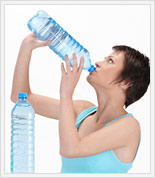|
|
Water & Weight Loss
QUESTION:
I've heard that water is necessary for weight loss and that I should drink as much as possible to help me in my weight loss efforts. Is this true?
ANSWER:
 There is some confusion surrounding the importance of water as it relates to weight loss. Unfortunately, more research is needed to clarify the issue. However, studies have clearly shown the importance of water in many other aspects, including some that are indirectly related to weight loss. Let's review what we do know: There is some confusion surrounding the importance of water as it relates to weight loss. Unfortunately, more research is needed to clarify the issue. However, studies have clearly shown the importance of water in many other aspects, including some that are indirectly related to weight loss. Let's review what we do know:
- To function at its best, the body needs to be well-hydrated. Our bodies are largely composed of water – about 55-60% of body weight. It helps with many tasks including
temperature regulation, cardiovascular function, waste product removal and metabolism.
- Although the body is efficient at regulating fluids, regular fluid intake (through food or drink) is required to keep the body hydrated. We lose fluid through respiration (breathing), sweating, and feces & urine. The result is a total body water turnover of approximately 5-10% per day. Luckily, our bodies are very good at compensating for normal fluctuations in fluid intake by either diluting or concentrating urine. However, sooner or later, water losses need to be replaced by fluid intake.
- Exercise is a hydration stressor. Due to water loss through sweat, dehydration can set in quickly during prolonged exercise – especially in hot and humid environments. The effects of dehydration are many and include decreased physical performance, cardiovascular stress, fatigue, depressed mental function, and heat illness. Increased perceptions of fatigue during exercise reduces your tolerance for exercise – and therefore your ability to burn more calories. (See Exercise & Avoiding Dehydration.) In addition, even small amounts of dehydration have been shown to cause general fatigue, which may affect your desire to even start an exercise session.
- The extreme opposite of dehydration can cause problems too. Ingesting large amounts of water without other added content (such as electrolytes, sugar, vitamins, etc.) can result in a medical complication known as hyponatremia. When too much plain water is ingested, large amounts of electrolytes (especially sodium) are transported from the blood and tissues into the small intestine, resulting in a dangerous electrolyte imbalance.
- A small study has indicated that metabolic rate increases following water consumption by as much as 30% and is sustained for over an hour.1 The mechanism of the increased calorie burn is thought to be a combination of the energy needed to heat the ingested water and additional unknown factors. The long-term effect of increased water consumption and weight loss has not been studied.
- Research has shown that cell hydration influences metabolism. However, changes in reactions at the cellular level cannot necessarily be extrapolated to whole body calorie balance. More research needs to be done to reveal whether extreme changes (either dehydration or optimal hydration) can actually influence the whole body's caloric expenditure and/or fat loss.
- Contrary to popular belief, water intake before or with meals has not been shown to decrease the number of calories consumed during meals.2,3 However, it is interesting to note that when foods with high water content (such as soup) are consumed prior to meal, subsequent caloric intake at the meal is decreased.
In summary, the direct link between water intake and weight loss is not clear and should not be the main reason for your hydration efforts. However, the importance of hydration to your health is very clear and hydration efforts are well worth your time. Maintaining optimal hydration levels enhances your vitality and ability to exercise, thereby increasing caloric expenditure. Although there may be caloric expenditures associated with water intake, the added benefit is small compared to the caloric cost of exercise. Given the rare but potential danger of excessive water intake, keep your water intake within the recommended daily water intake.
1 Water Induced Thermogenesis. J Clin Endocrinol Metab 88:6015-6019, 2003.
2 Water Incorporated Into a Food But Not Served With A Food Decreases Energy Intake In Lean Women. Am J Clin Nutr 70:448-455, 1999.
3 Does the Consumption of Caloric and Non-Caloric Beverages With A Meal Affect Energy Density? Appetite 44:187-193, 2005.


Our expert, Dr. Sharon E. Griffin, holds a B.S., M.S., and Ph.D. in the areas of exercise science/physiology. She also holds a second M.S. degree in Nutrition and is a licensed nutritionist and an ACSM certified health and fitness instructor. |

 There is some confusion surrounding the importance of water as it relates to weight loss. Unfortunately, more research is needed to clarify the issue. However, studies have clearly shown the importance of water in many other aspects, including some that are indirectly related to weight loss. Let's review what we do know:
There is some confusion surrounding the importance of water as it relates to weight loss. Unfortunately, more research is needed to clarify the issue. However, studies have clearly shown the importance of water in many other aspects, including some that are indirectly related to weight loss. Let's review what we do know:




